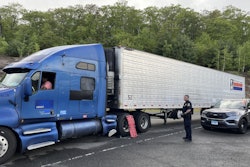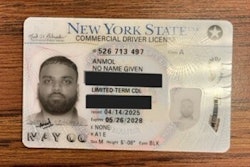DOT Secretary Sean Duffy late Wednesday afternoon, October 15, announced that the Federal Motor Carrier Safety Administration (FMCSA) will withhold more than $40 million from California to force the state to enforce English language proficiency (ELP) standards for commercial truck drivers.
DOT’s move against California follows a warning in August that gave the state 30 days to come up with a plan to comply with rules requiring enforcment English language proficiency as an out-of-service violation.
“I put states on notice this summer: enforce the Trump Administration’s English language requirements or the checks stop coming," Duffy said. "California is the only state in the nation that refuses to ensure big rig drivers can read our road signs and communicate with law enforcement. This is a fundamental safety issue that impacts you and your family on America’s roads."
In total, $40,685,225 of Motor Carrier Safety Assistance Program (MCSAP) funding awarded to California will be impacted. MCSAP provides grant funding for states to conduct roadside inspections, traffic enforcement, safety audits of trucking companies, and public education campaigns.
“Let me be clear -- this is valuable money that should be going to the great men and women in California law enforcement, who we support," Duffy added. "Gov. Newsom’s insistence on obstructing federal law has tied my hands."

[Related: California defies DOT's 30-day ELP enforcement deadline, faces funding loss]
For FMCSA to restore funding, DOT said, California must adopt and actively enforce a law, regulation, standard, or order that is compatible with the federal ELP requirement for commercial drivers. DOT said this means state inspectors need to begin conducting ELP assessments during roadside inspections and place those who fail out-of-service.
ELP for truck drivers was returned to the out-of-service criteria in June, and federal data analyzed by Overdrive and sister company RigDig Business Intelligence recently showed that California is one of almost 20 states that actually had a decline in ELP violations since June.
[Related: Trucking English language enforcement: The toughest and most lax states]
However, the state never formally adopted the federal rule, and California Highway Patrol has told Overdrive it does not enforce English language proficiency as an out-of-service violation because it is “not part of California law.”
DOT cited CHP’s statement to Overdrive in its release announcing the MCSAP funding cut-off. CHP has not responded to Overdrive inquiries about the federal action. California's DMV previously said it's "currently reviewing the federal government’s issued guidance" and has until October 25 to respond.
[Related: Six states issuing CDLs 'not consistent with federal regulations': What's going on]
As previously reported, California normally adopts CVSA's updated OOS criteria in April of every year, and at that time hadn't made any special effort to move quickly on ELP rules. A rulemaking effort in California could include up to a 60-day period for public comment.
For perspective on the $40 million, California’s government operates with a $300 billion annual budget and an $11 billion "rainy day" fund.
DOT also ordered California to shut down issuance of non-domiciled CDLs, and on September 26 the state was given 30 days to come into compliance with DOT’s new rule seeking to remove CDL privileges from 97% of non-domiciled CDL holders or face losing $160 million in federal highway funding. As part of the rulemaking, DOT pointed to a non-domiciled CDL issuance error rate of roughly 25% in California.
The same day DOT pulled the $40 million from California, Florida's Attorney General James Uthmeier filed a lawsuit against the state over its CDL issuance practices. Uthmeier vowed to pursue action against the state back in August, after California-issued non-domiciled CDL holder Harjinder Singh's triple-fatal Florida turnpike crash.
Florida did not enforce ELP as an out-of-service violation until after the August 12 crash, but since the June OOS change it's issued roughly 69% more ELP violations than in prior months.










